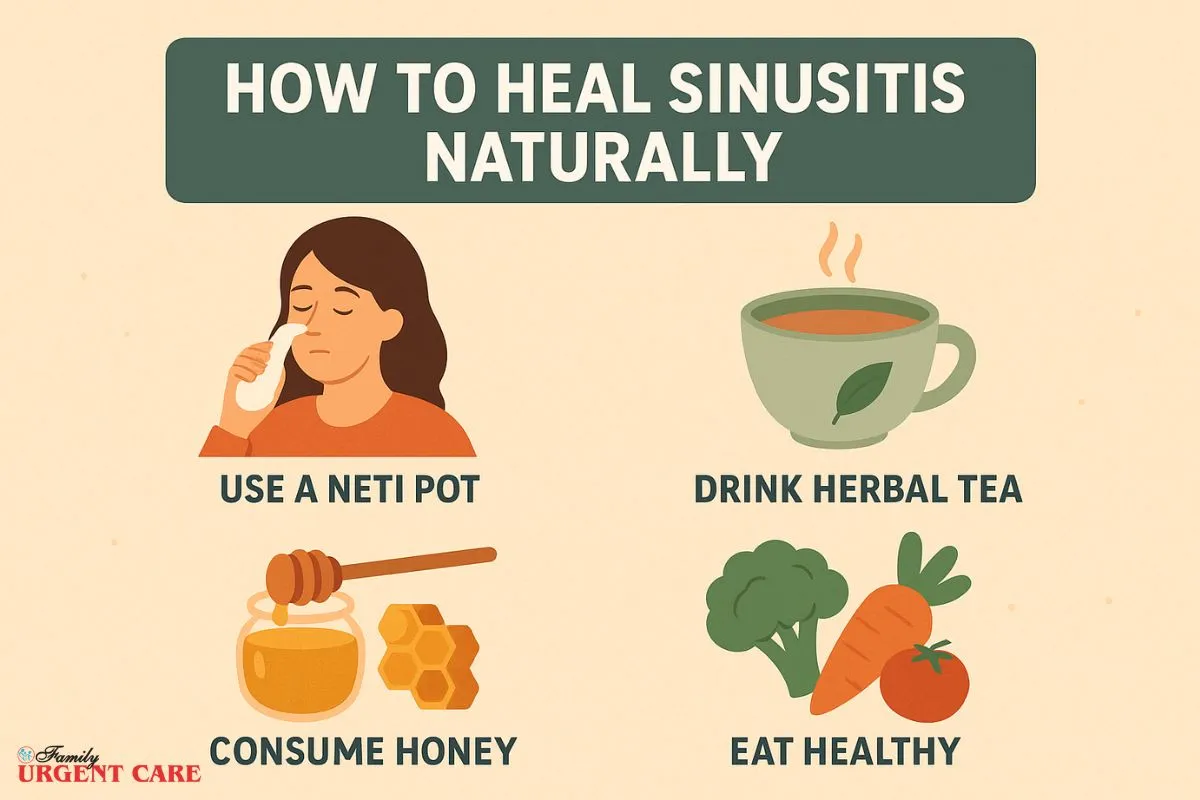Do you often feel that dull facial pressure or wake up with a stuffy nose that just won’t quit? That persistent congestion might not be a “cold” but sinusitis in disguise.
Sinusitis occurs when the air spaces (sinuses) around your nose and eyes get swollen or blocked due to infections and allergies. This might result in breathing issues, throbbing headaches, and facial pressure that drags on for weeks.
It affects more than 30 million people in the U.S. each year, making it one of the most common health complaints worldwide.
While antibiotics or nasal sprays may provide short-term relief, they rarely address the root cause. That’s why more people are turning to natural, evidence-based remedies for lasting relief.
In this guide, we’ll explore the most effective natural ways to heal sinusitis. These will help you breathe, sleep, and live with ease.
Table of Contents
ToggleWhat Triggers Sinus Infections?
Sinus inflammation often starts when the thin lining inside your sinuses swells up, blocking the normal flow of mucus. This can happen for several reasons.
- Allergies: Pollen, dust, or pet dander can irritate your nasal passages, leading to swelling and congestion.
- Infections: A common cold or flu can cause your sinuses to fill with mucus. This creates an ideal environment for bacteria or viruses to grow.
- Environmental Irritants: Smoke, pollution, or strong chemical smells can dry out and inflame the sinus tissues.
- Nasal Polyps: These small, soft growths inside the nasal cavity can block airflow and trap mucus.
- Weakened Immunity: When your immune system is low, your body struggles to fight off infections, making sinus issues more frequent or long-lasting.
In most cases, sinusitis isn’t caused by just one trigger. It could be a combination of these factors that inflames the sinuses and makes it harder for them to drain properly.
Key Symptoms to Watch For
Sinusitis can show up in various ways, and symptoms often feel like a stubborn cold that won’t go away. Common signs include
- Facial pressure or pain — often felt around the eyes, forehead, or cheeks.
- Nasal congestion or blockage — making it hard to breathe through your nose.
- Headache — especially when bending forward or waking up in the morning.
- Loss or reduced sense of smell and taste.
- Postnasal drip — mucus running down the back of your throat may cause coughing or throat irritation.
- Tiredness or fatigue — as your body fights off inflammation.
Note: If your symptoms last longer than 10 days, worsen after initial improvement, or come with a high fever or severe facial pain, it’s best to seek medical help. This could indicate a bacterial infection or chronic sinusitis that requires professional care.
Natural Remedies to Heal Sinusitis at Home

You don’t have to always rely on pills to find relief from sinus pain and pressure. Simple, natural remedies can also help clear congestion, reduce inflammation, and support faster healing from the comfort of your own home.
Steam Inhalation
Steam inhalation is one of the simplest and most effective ways to ease sinus pressure naturally. The warm, moist air helps open up blocked nasal passages, loosen thick mucus, and soothe irritated tissues. For added relief, you can add a few drops of eucalyptus or peppermint essential oil to the steaming water. These have natural decongestant properties.
Steam works best when done regularly, especially before bedtime, to help you breathe more comfortably through the night.
Nasal Irrigation with Saline
Think of nasal irrigation as a gentle rinse for your sinuses. Flushing out trapped mucus, dust, and allergens helps keep your nasal passages clear and reduces inflammation naturally. All you have to do is
- Combine ½ teaspoon of salt with 1 cup of warm, distilled, or boiled water.
- Using a nasal aspirator or netipot, tilt your head over a sink and pour the solution into one nostril. The solution will carry mucus and irritants out through the other nostril.
- Always use clean, sterilized equipment to avoid contamination.
Regular practice (once or twice a day) can ease congestion, calm irritated sinuses, and make breathing feel lighter and easier.
Stay Hydrated to Thin Mucus
Sinusitis often feels worse in winter. Cold, dry air can irritate your sinuses and make your nose feel blocked. That’s when your body requires fluid to cope. Drinking plenty of water, sipping warm herbal teas, or having a comforting broth helps loosen mucus and keeps your nasal passages clear.
At the same time, it’s best to avoid dehydrating drinks, such as coffee, alcohol, or sugary sodas. These not-so-healthy options can thicken mucus and make congestion worse.
Use Warm Compresses
Feeling a heavy pressure across your cheeks or forehead? A simple warm compress can work wonders. Applying gentle heat to your face helps improve blood flow, relax tense sinus tissues, and ease that constant congestion. The warmth also helps to drain mucus more easily. It gives instant relief from the tight, stuffed-up feeling.
For best results, repeat the procedure several times a day, especially when sinus pressure increases. You’ll notice a soothing difference in no time.
Try Anti-Inflammatory Foods and Spices
What if the secret to clearing your sinuses was sitting right on your kitchen counter? Certain foods and spices like ginger, turmeric, garlic, and omega-3-rich ingredients act as natural anti-inflammatory agents. They help to calm swelling in your nasal passages and ease that stubborn sinus pressure.
These powerhouse ingredients also support your immune system. As a result, your body gets a better chance to fight off infections.
Rest and Sleep Well
A good night’s sleep is like a reset button for your body. It gives your immune system the energy it needs to fight off infections and reduce sinus inflammation. Studies show that adults who get less than 6 hours of sleep are nearly 4 times more likely to catch a cold compared to those who sleep 7–8 hours.
To help your sinuses breathe easier at night, try small bedtime habits like
- Sleep with your head slightly elevated to encourage drainage
- Use a humidifier if the air is dry
- Avoid caffeine or heavy meals close to bedtime.
These simple adjustments can make a big difference in how well your sinuses clear and how rested you feel the next day.
Lifestyle and Prevention Tips for Long-Term Sinus Health
Taking care of your sinuses is more about building healthy habits. Making small, consistent changes in your daily life can make a big difference in preventing flare-ups.
Manage Allergies Proactively
Allergens are a silent trigger for sinus inflammation, so keeping them in check can make a huge difference. Try these strategies.
- Dust-proof your home: Cover mattresses and pillows with allergen-proof covers. Vacuum regularly to keep dust and allergens at bay.
- Use air purifiers: A high-quality purifier can effectively trap pollen, pet dander, and other tiny irritants that float in the air.
- Avoid triggers: Limit exposure to pollen, pets, or smoke whenever possible.
- Wash bedding often: Clean sheets and pillowcases remove trapped dust and allergens that build up over time.
- Close windows during high-pollen days: This simple step helps keep outdoor irritants from entering your home.
Strengthen Immunity Naturally
Your immune system is your body’s first line of defense against any factor that gives rise to sinus problems. Boost it with simple, daily habits that are given below.
- Eat a balanced diet: Fill your plate with colorful fruits, leafy greens, and whole foods rich in vitamins and antioxidants.
- Include probiotics: Yogurt, kefir, or fermented foods support gut health, which is closely linked to immune strength.
- Exercise regularly: Moderate activity like walking, yoga, or cycling can improve circulation and enhance immunity.
- Stay consistent: Building these habits over time gives your body a better chance to fight off infections before they inflame your sinuses.
Keep Indoor Air Moist
Dry air can irritate your nose and make sinus symptoms worse. A few tweaks can keep your home sinus-friendly.
- Use a humidifier: Maintain indoor humidity around 40–50% to prevent dryness in nasal airways.
- Add water near heat sources: A bowl of water on radiators can naturally humidify a dry room.
- Sprinkle water on rugs or plants: This helps create a subtle, constant moisture in the air.
Conclusion
Healing sinusitis naturally comes down to simple, consistent care. Gentle remedies like steam inhalation, nasal rinses, staying hydrated, and eating anti-inflammatory foods can help relieve congestion and reduce inflammation.
Supporting these with good sleep, a strong immune system, and healthy daily habits helps your sinuses heal from the inside out.
If your symptoms persist for longer, consider visiting Family Urgent Care instead of trying to manage them on your own. What feels like simple congestion could be something serious. Our specialists treat the real cause and help you breathe comfortably again.
FAQs
Q1. Can sinusitis go away on its own?
Yes. Mild sinus infections often clear up naturally with rest, proper hydration, and supportive home care.
Q2. How long does it take to recover from sinusitis naturally?
For most acute cases, 1–2 weeks of consistent natural remedies like steam inhalation, nasal rinses, and hydration can help you feel better.
Q3. Are essential oils safe for sinus infections?
Yes, if used correctly. Always avoid direct skin contact and don’t inhale concentrated vapors. A few drops in steam or a diffuser can safely help ease congestion.
Q4. Can diet affect sinus health?
Absolutely. Eating anti-inflammatory foods like ginger, turmeric, garlic, and omega-3-rich foods can reduce swelling and support faster sinus healing.


